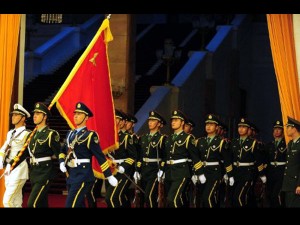China to neighbors: Stop oil search in Spratlys
MANILA, Philippines—(UPDATE) China warned Asian neighbors Thursday to stop searching for oil near the disputed Spratly Islands and vowed to assert its sovereignty over the potentially petroleum-rich territory in the West Philippine Sea (South China Sea) despite rival claims.
China and the Philippines have swapped diplomatic protests over the islands, with Filipino officials accusing Chinese forces of intruding into Manila-claimed areas six times since February and of firing shots in at least one incident. Beijing denied the allegation Thursday and said it would use violence only when attacked.
The Spratlys, which are believed to be atop vast oil and gas reserves, have long been feared as a potential flash point of armed conflict in Asia.
The chain of barren, largely uninhabited islands, reefs and banks, are claimed wholly by China, Taiwan and Vietnam and partly by the Philippines, Malaysia and Brunei.
Addressing Manila’s complaints for the first time, Chinese Ambassador Liu Jianchao denied that his government committed any intrusion.
He said that China has not started to drill for oil in the contested region and warned other claimants to stop any oil exploration in the Chinese-claimed area without Beijing’s permission. China claims the entire West Philippine Sea.
“We’re calling on other parties to stop searching for the possibility of exploiting resources in these areas where China has its claims,” he told reporters.
China, however, is open to engaging other claimant countries in jointly exploring for oil and gas in the region, he said.
Asked what would happen if countries defy China, Liu said that Beijing would assert its right over the disputed region diplomatically and not resort to force unless it comes under attack. “We will never use force unless we are attacked,” he said.
In the most serious incident reported by the Philippines, Chinese navy vessel allegedly fired February 25 to scare away Filipino fishermen from Jackson Atoll, which is claimed by Manila and relatively close to Philippine shore.
The Philippine government also accused two Chinese patrol boats of harassing a Filipino oil exploration ship on March 2 into leaving a vast area called the Reed Bank. A Filipino general scrambled two military aircraft, which arrived after the Chinese vessels had left, the Philippine military said.
Liu said no Chinese vessel fired on Filipino fishermen but suggested that Chinese forces took action to keep the Filipino exploration ship from the Reed Bank.
“That’s part of our exercise of jurisdiction. It’s not harassment,” Liu said.
He also dismissed concerns raised by the United States, a key Philippine military ally, that the dispute over the Spratlys could hamper the passage of commercial ships in the West Philippine Sea. Liu said that the area would remain peaceful.
The tug-of-war between China and the Philippines over the islands has raised questions about a role Washington could play to help solve the dispute and keep some of the world’s busiest sealanes open and secure.
David Carden, Washington’s ambassador to the Association of Southeast Asian Nations, said last month in Manila that the Spratly claimants need to create a strong regional mechanism to tackle the dispute. He said that the US can help.
China, however, would only discuss the dispute bilaterally with other claimant countries, Liu said.
“The US is not a party to the disputes,” he said. “These maritime waters have always been peaceful and secure.”















